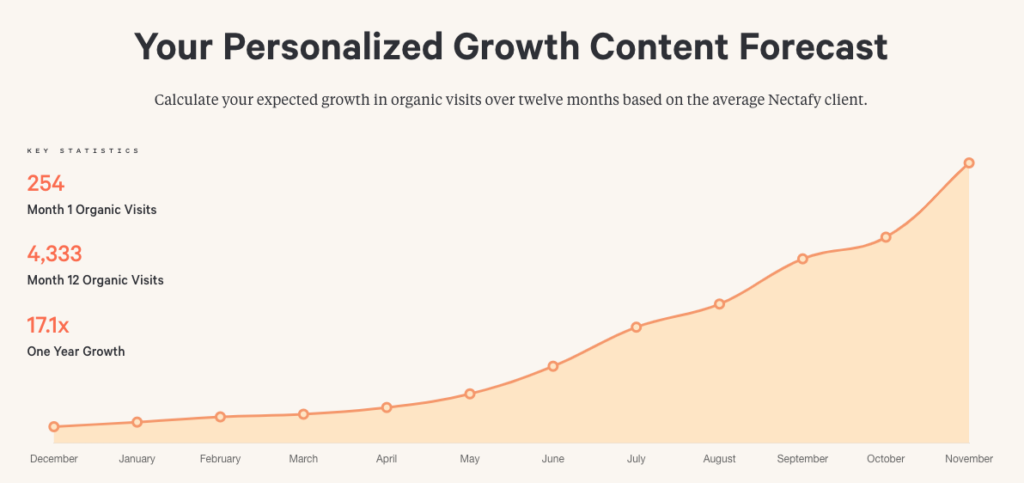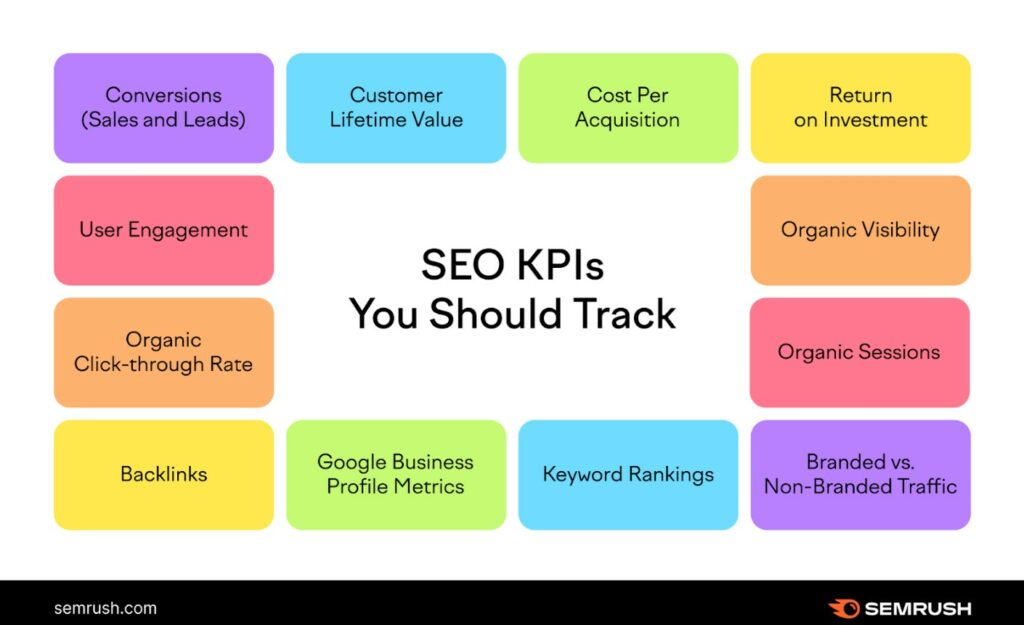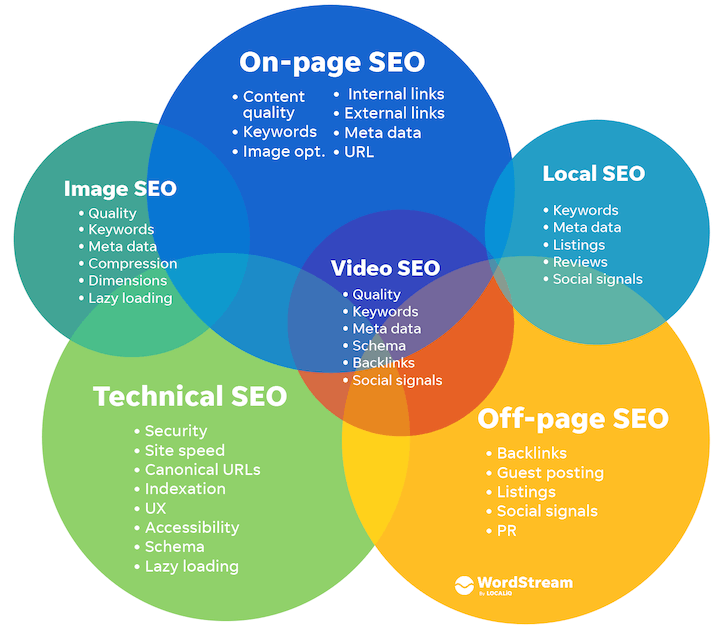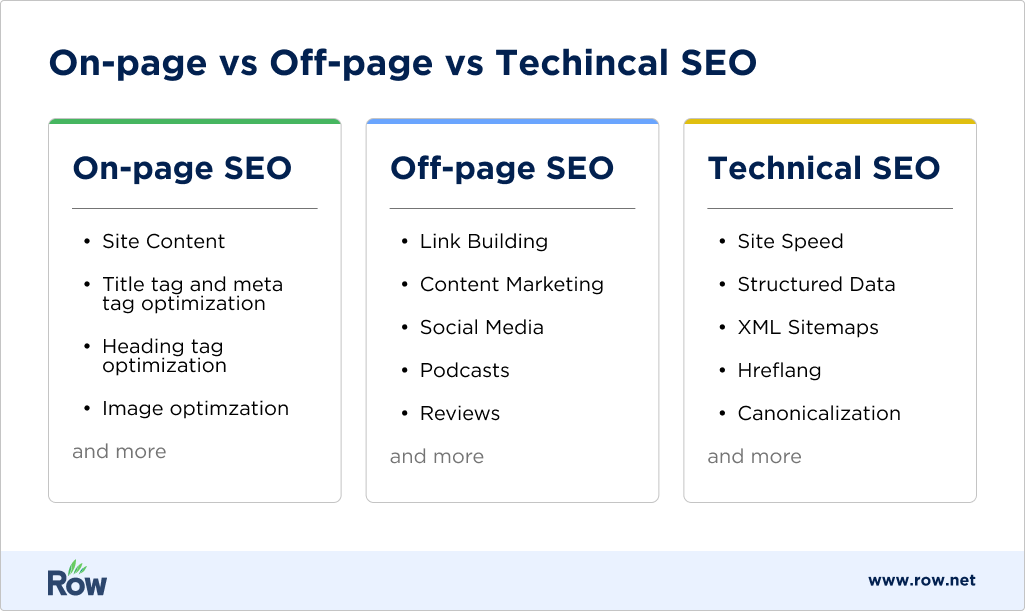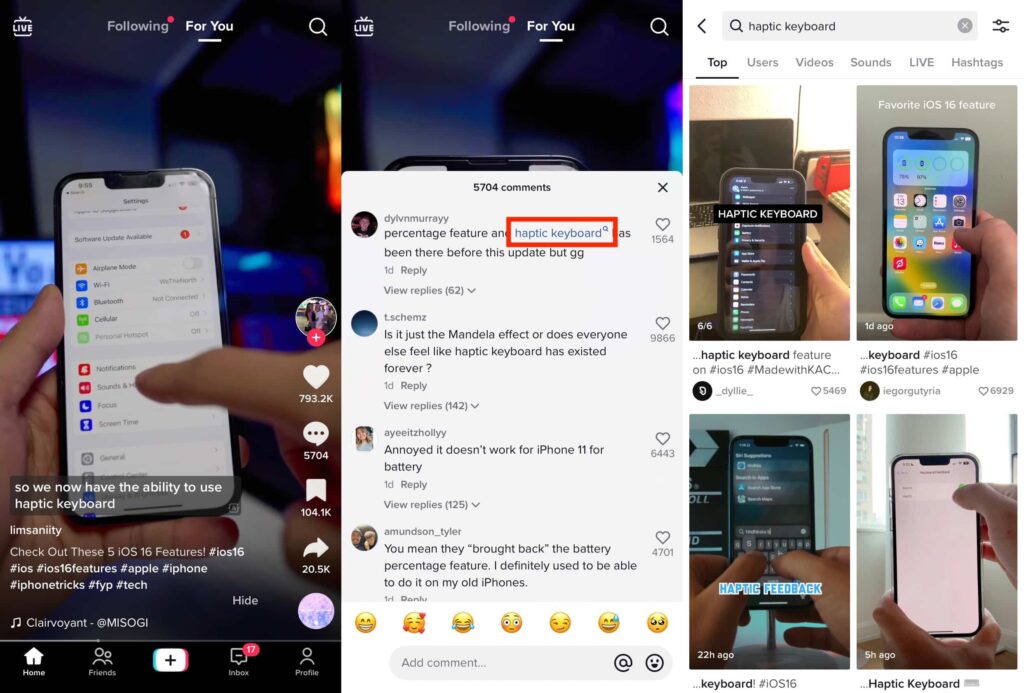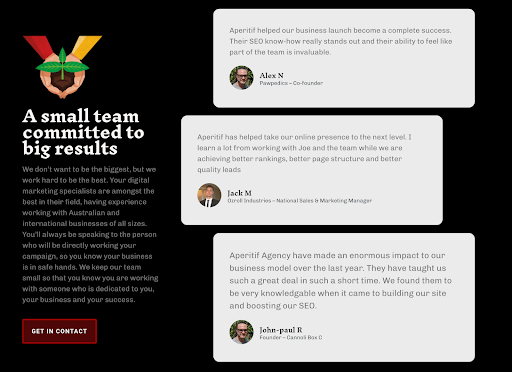Every marketer and business owner wants to increase traffic to their website, but how do you do it effectively? There are some simple ways to boost website traffic, and all are explored in detail below.
The real trick, though, is to drive traffic using methods that also convert into sales. Check out these eight marketing tips to increase website traffic and become a better content marketer.
How long does it take to grow organic traffic?
Unfortunately, there is no quick fix when it comes to marketing. It typically takes 4-6 months to see an improvement in organic website traffic.
Image credit: Nectafy
Why the delay? The initial stages are taken up by research and developing a content marketing strategy. Following that, website and content modifications can take quite a long time.
Some metrics, like bounce rates, improve quite quickly. As you continue marketing, everything else will fall into place with time.
How can I increase my traffic quickly?
It’s somewhat impossible to solve a website traffic issue with a snap of your fingers. The period of 4+ months to increase traffic might seem like a while, but it’s well worth the wait.
In terms of priority, you can start making the following adjustments quickly:
- Update old content and make sure you are using high-value targeted keywords
- Improve user experience so that your bounce rate drops and people return to your site
- Start researching new ways to market your content
The primary focus when driving traffic to your website is usability and discoverability. To achieve both of these traits, make sure you have strong branding and a clear idea of your ideal buyer persona. That way, you can build a website and content that works for your target market.
How can I improve my organic sessions?
Generating traffic organically means you are not paying for ads. There are numerous methods of getting people to see and click on your site, which doesn’t involve paying for Facebook or a Google Ad, for example.
Image credit: Semrush
You must prioritise user experience while adapting your website for search engine optimisation. Consider users’ intent when they visit your website but also use a research tool to implement high-value keywords in your content.
With these basic principles, you can increase organic search traffic to various web pages, eventually driving sales. Here are eight detailed tips to help you.
1. Search Engine Optimization
SEO is a huge part of increasing organic traffic. There are multiple ways to optimise content for search engines, one of which is by improving your content. Content and SEO go hand in hand, so if you want to increase search traffic, you need to target keywords.
Image credit: WordStream
Start by optimising existing content and implementing fresh, high-ranking keywords. Crucially, you should also target long-tail keywords. While millions of people are Googling ‘SEO,’ fewer search for ‘using SEO to increase traffic.’ Thus, you are more likely to rank higher on the search results.
Another way to boost rankings is to use local SEO, implementing keywords like ‘near me’ or mentioning a specific city where you have a physical store. You can use a keyword research tool or SEO plugins to determine the best high-value keywords where you are still likely to rank in people’s search queries.
Although you attempt to appease Google algorithms with SEO content, you also want to improve usability. Consider the search intent of your readers and develop content that answers their questions and shows the value of your business.
Your keyword research can also help you develop questions to use in H2s. If you answer the questions people ask within your article, Google might use it as a featured snippet, which also benefits SEO.
In a similar vein, make sure both your website’s content and meta descriptions are optimised for search engines.
2. Website optimisation
Technical SEO is another important (and sometimes overlooked) aspect of optimisation. For example, Google ranks websites higher with fast loading speeds, rendering, and correct HTML tags.
On-page SEO does not only concern the written content but also things like site structure and internal linking. To rank highly in search engine results, ensure your entire website is up to scratch.
Image credit: Row
You can assess the health of your site by using Google Search Console, which can let you know if you need to take any urgent action. Some WordPress SEO plugins can also assist with this matter.
While search engines may prioritise factors such as using keywords in title tags, the website design is also relevant. Your site needs to be crawlable so that search engines can index it, which means adding internal links.
Plus, user experience plays a role. Therefore, your SEO goals should always consider the user because if you rank highly on Google. Still, users exit your site immediately and never click on it again; your efforts are well-spent.
For this reason, ensure your site is optimised for mobile devices. According to Hitwise, almost 60% of searches are conducted on mobile, so if you aren’t tapping into this market, you should be.
3. Email marketing
Other means of driving traffic are not explicitly related to your site. Instead, you can increase brand awareness and encourage clicks using other parts of your marketing strategy.
Effective email marketing is a fantastic way to keep users returning to your site. It reminds them about your content, which means more views. Furthermore, it allows you to gather data on your audience.
For example, look at what kind of emails get the highest open rate and which topics appeal to your audience. Then, create more compelling content based on what your customers want to see. Returning to SEO, you can produce content that ranks highly in the result pages, driving traffic to your site.
4. Social marketing
Social media marketing is now one of the most lucrative forms of outreach. Your customers are most likely using social media, constantly consuming content on social platforms. A lot of this content is marketing, and it’s effective.
More and more social platforms are implementing their forms of search engine optimisation. Gone are the days when hashtags are the only way to browse Instagram; the Meta-run platform now has a keyword search function.
TikTok, too, is moving in the direction of a search engine, which makes it essential to use popular keywords in captions and videos so that users can find your content. In other words, start implementing SEO strategies into your socials.
Image credit: HubSpot
It is essential to optimise your content, but you can also try social media outreach. Find your ideal clients, start conversations, and build relationships to work on social selling. Alternatively, interact with other brands and influencers in your niche to get your name out there.
Promoting your content on social media boosts brand awareness and image. When your target audience is ready to do a transactional search, they may type your business into Google, increasing organic search traffic.
There are numerous ways of increasing website traffic using social media; just keep search engine ranking factors in mind and build a positive brand association.
5. Social proof
You can also leverage social proof to drive traffic to your website. For example, post customer testimonials and encourage your buyers to post about you on social media, creating a compelling reason to buy from your business.
Image credit: Aperitif
Social proof is an excellent tactic for lead generation, but it’s also ideal for driving organic traffic to your website.
You can increase organic traffic when others who see these testimonials search for your business online. Some ways to create social proof and drive organic search traffic are:
- Post reviews and testimonials on social media
- Pin reviews to your website
- Encourage buyers to post photos/videos of your products under a hashtag
6. Offline marketing
Not all content strategies occur online, which might sound strange to a digital marketer. However, don’t underestimate the power of good, old-fashioned networking.
You don’t need to invest in paid media ads or billboards. Instead, you can work offline by attending workshops, trade fairs, and conferences.
DuckDuckGo boldly increased brand awareness and attracted new customers by erecting a billboard in San Francisco’s tech-heavy SOMA district that boldly proclaimed “Google Tracks You. We Don’t,” challenging Google’s privacy practices and drawing attention to their search engine’s commitment to user privacy.
Image credit: Wired
In addition, networking with others in your industry is a great way to create a buzz and drive organic traffic later. While this method does not yield immediate results, you should notice it.
7. Link building
Link building, or link earning, is one of the keys to successful organic traffic. Instead of adding an internal link network to your site, you need to earn hyperlinks from other websites back to your pages.
One way to do this is by establishing yourself as a credible authority in your niche. Use case studies and fresh analyses to encourage links back to your site. Another method is guest blogging.
By getting featured guest posts on other websites, you can get your name out there, increase your credibility, and build a positive image. In the end, this all drives organic traffic to your website.
8. Be consistent
The final thing to keep in mind is consistency. Digital marketing is something you can only do once and never again. Instead, you need to have a constant stream of high-quality content if you want to create a successful organic traffic increase.
Increasing your organic traffic doesn’t happen overnight, so have a content strategy and stick to it. Even more crucially, use analytics to track your improvements and make adjustments as necessary.
How can I increase my organic traffic conversion rate?
More than just improving traffic alone is required; you must also consider other data, such as clickthrough and conversion rates. The clickthrough rate (CTR) can determine your SEO efforts’ success, but converting those clicks into sales is even more critical.
You can improve your rank until you hit the top spots for various keywords, but you also need to convert those views to benefit your business ultimately.
Many SEO tools also have analytics software to help you see the data. To a content marketer, data is essential. So make sure you understand the data and implement it in the future.
Consider the organic funnel technique to increase conversion rates:
- Understand the search intent of your site visitors.
- Provide high-quality and relevant content that the reader wants to see, then solve their problem.
- Use calls to action to encourage readers to subscribe or purchase.
- Analyse data and keep remarketing.
How do I increase traffic in Google Analytics?
Google Analytics can be a beneficial tool when trying to boost site traffic. It will show you your overall traffic, which means not all of it may be organic. Nevertheless, its data can help you continually increase website traffic.
First, Analytics will show you user demographics and behaviours, which helps you establish more about your targeted audience. This way, you can better optimise content to target them.
You can see your highest-performing content and utilise it to optimise other content further.
Summing up
Boosting website traffic requires a comprehensive approach that combines effective SEO techniques with a seamless user experience and strategic outreach marketing to enhance brand visibility. Remember, it’s an ongoing process that may require continuous adjustments to achieve sustained growth.
Utilise analytics tools to gain valuable insights and make informed decisions. Embrace the holistic nature of website traffic optimisation to drive success.
Ready to take your website’s organic traffic to the next level? Look no further than Aperitif Agency. With our expertise in SEO and Google Ads management, we can help you implement effective strategies that drive high-quality organic traffic to your website.

